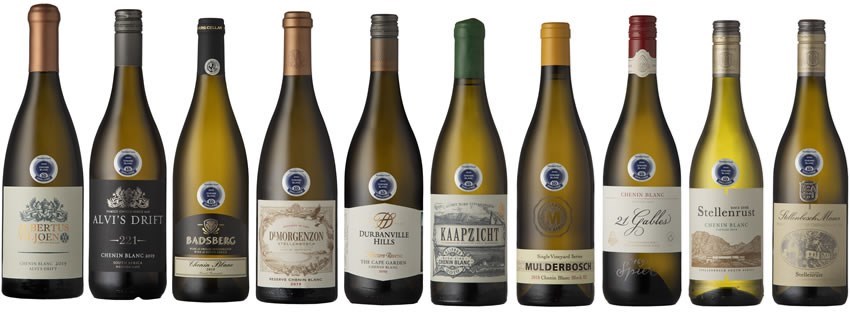“From Stellenbosch to Worcester, Breedekloof and the cooler-climate Durbanville, these wines really do demonstrate Chenin’s ability to successfully put down roots in a variety of growing conditions. With the mounting impact of climate change worldwide, it’s not surprising that so many growers in the Americas and Australasia are now looking to it as the grape of their future, too”.
Forrester said South Africa’s critical and commercial success with Chenin was inspiring many producers around the world. “It’s why there has been such a groundswell of interest in the International Chenin Blanc Summit to be hosted in South Africa next year. At the same time, it’s why our Chenins have become the go-to choice for so many consumers in export markets. It’s their way of showing support for our industry during these difficult times. Make no mistake, they do so, not as an act of charity but as a mark of respect for and confidence in our wines.
“You know what they say: South African Chenins are a lot like South Africans themselves – vibrant, resilient and readily responsive to changing circumstances. Both the vines and the people put down deep and tenacious roots. It’s how we overcome adversity and even flourish under stress.”

The Standard Bank/Chenin Blanc Top 10 Challenge 2020 winning wines.
Speaking on behalf of the judges, panel chair James Pietersen said this year’s top ten were sourced mainly from mature vines, with some as old as 48 years. “From the 136 wines we assessed we found a clear link between wine quality and older, established vines. Seven of the top ten wines were harvested from vines 35 years’ old at the very least, and in another instance the age of the vines ranged between 25 and 40 years.
“Across the spectrum of styles, we noticed an appealing freshness and vivaciousness. Part of the reason was the impact of nuanced, sophisticated oaking, with some producers this year introducing larger 1 500-litre and 2 500-litre barrels to their wood regimes. Also noteworthy was that for the second time only in the history of the challenge, now in its seventh year, one of the wines selected was entirely unwooded. It came from a 43-year-old vineyard. We see it as confirmation that oak is in no way an absolute as far as depth and complexity are concerned.”
He said there were three newcomers to the Top Ten line-up. First-timer Alvi’s Drift delivered two of the winning wines. The other producers to debut were Badsberg and Kaapzicht.
“Remarkably, Stellenrust, with two wines this year – one the unwooded expression - is the only producer to have featured on the challenge every year since its inception in 2014. DeMorgenzon and Spier have also been regular winners, while all the others on the list have also made multiple appearances.”
Pietersen said that while the composition of the judging panel was deliberately changed each year to allow for fresh perspectives, “the appearance of some of the same producers year after year speaks to a consistency of attributes sought by the judges, whomever they are. Nevertheless, the line-up also shows there is ample accommodation of new players.”
Stephan van der Merwe, head of commercial banking at Standard Bank in the Western Cape, confirmed that his organisation would be awarding a cash prize of R25 000 for each of the winning wines. According to the competition stipulations, the money goes towards producer projects intended to “reinforce economic and social benefits in the workplace".
To date, R1,35 million has been distributed, with producers thus far investing in a range of initiatives to enhance the lives of their worker communities. These have ranged from educational, to health and housing projects.
The winning wines retail from R68 a bottle to R430.
Listed alphabetically, they are:
- Alvi's Drift Private Cellar 221 Chenin Blanc 2019
- Alvi's Drift Private Cellar Albertus Viljoen Chenin Blanc 2019
- Badsberg Wine Cellar Barrel Fermented Chenin Blanc 2019
- DeMorgenzon Reserve Chenin Blanc 2019
- Durbanville Hills Collectors Reserve The Cape Garden Chenin Blanc 2019
- Kaapzicht Kliprug Chenin Blanc 2019
- Mulderbosch Vineyards Single Vineyard Chenin Blanc Block S2 2018
- Spier Wines 21 Gables Chenin Blanc 2019
- Stellenrust Chenin Blanc 2019
- Stellenrust Stellenbosch Manor Barrel Fermented Chenin Blanc 2019
This year’s judges were James Pietersen (panel chair), Wine Cellar’s South African portfolio manager and a regular judge in this and several other leading local wine competitions; winemaker Boela Gerber Cape Wine Master of Groot Constantia; sommelier Higgo Jacobs, who is also a senior judge at the International Wine Challenge (IWC) and Decanter World Wine Awards and a past chairman of the South African Sommelier Association (SASA); Tinashe Nyamudoka, formerly a sommelier with chef Luke Dale Roberts and now a wine marketer; and Penny Setti, sommelier at Chef’s Warehouse. Tendai Marisa, sommelier at Indochine, served as an associate judge.
Appendix 1 - snapshot of winning wines, their vintages, chemical analyses, wooding (or not) and prices - download here
Appendix 2 - summary of the tasting notes for each wine - download here